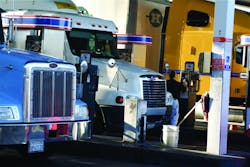Managing fuel expenses focus of webinar
A webinar is scheduled for Thursday, May 17, at 1 p.m. EST on how to effectively manage fuel costs. The webinar, “Best Practices for Managing Fuel Costs,” has a corresponding eBook, “Managing Fuel Costs with Networkfleet,” available for free.
Both are being offered by Networkfleet and are designed to show how telematics and GPS fleet tracking technology can help companies manage their fleet’s fuel consumption and better control fuel costs.
The eBook and webinar include specific actions managers can take to monitor fuel use, change driver behavior and implement a successful fuel reduction strategy. The areas of focus are:
- Minimizing idle time
- Reducing excessive speeding
- Preventing unauthorized vehicle use
- Improving routing efficiency
- Improving vehicle health through engine diagnostics
- Verifying fuel expenditures
According to Networkfleet, following the advice outlined in these actions in combination with internal policies and oversight, fleets should see a 10-25% decrease in fuel usage.
To register for the webinar, click here.
